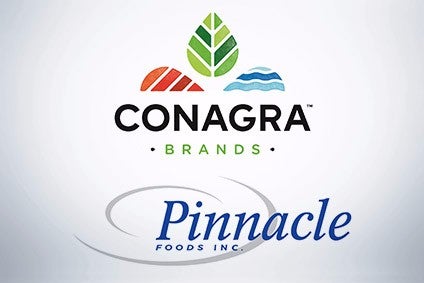
just-food’s index of mergers and acquisitions in the international packaged food sector highlights the volume of deals being announced, as company strategists look to M&A to gain an edge on their competition.
Our index of food-industry M&A centres on deals involving an at least majority shareholding being taken in a company, as well as including the sale of subsidiaries, divisions and brands.

Discover B2B Marketing That Performs
Combine business intelligence and editorial excellence to reach engaged professionals across 36 leading media platforms.
The index also focuses on deals involving packaged food manufacturers, excluding those between suppliers into the sector and those including drinks companies.
June saw 28 such transactions, up from 21 in the same month of 2017 and a rise from the 23 announced in May 2018.
June proved the second-most active month of 2018 so far. Three of the deals came from Graeme Hart – reputed to be New Zealand’s richest man – and his son Harry, who snapped up Hansells Food Group, local cereal maker Hubbard Foods and Gregg’s sauce unit.
Canada-based meat processor Olymel announced two acquisitions in June, buying Ontario chicken business Pinty’s Delicious Foods, plus Quebec-based supplier Triumphe Foods.

US Tariffs are shifting - will you react or anticipate?
Don’t let policy changes catch you off guard. Stay proactive with real-time data and expert analysis.
By GlobalDataIn the UK, June saw two acquisitive manufacturers again get out their chequebooks. UK snacks manufacturer Tayto Group moved to buy The Real Pork Crackling Company, a deal that followed its May purchase of UK popcorn firm Pop Notch.
And frozen-food giant Nomad Foods, which has already acquired pizza assets from Boparan Holdings this year, broadened its product range once more with the purchase of the Aunt Bessie’s business from UK manufacturer William Jackson Food Group.
However, the stand-out deal announced in June came in the US, where two of the country’s major manufacturers announced a deal to join forces.
Conagra Brands is to pay US$10.9bn for fellow US manufacturer Pinnacle Foods. The companies, home to brands like Orville Redenbacher’s popcorn and Gardein vegetarian foods, were reported last summer to have been in talks over a deal, although those discussions were said to have broken down over price.
The businesses are major players in the US frozen-food category, with Conagra’s stable including Banquet ready meals and Pinnacle’s portfolio housing Birds Eye.
In April, activist investor Jana Partners acquired just over 9% of Pinnacle and said it would hold talks with the company’s board on “value-creation measures”, which for the fund included “evaluating alternatives to realise [Pinnacle’s] strategic value, including a sale or other consolidation opportunities potentially available to the [company] as a result of its scale position in the frozen foods sector”.
Conagra outlined the merger with Pinnacle as being a “complementary portfolio of iconic brands” that will give the newly-combined entity an “enhanced ability to capitalise on trends in frozen foods”. The acquisition will “serve as a catalyst to accelerate value creation for shareholders”.
Not all on Wall Street welcomed the deal. Shares in Conagra closed down more than 7% on the day the transaction was announced.
Alexia Howard, a US food analyst with investment bank Sanford Bernstein, said: “Overall, we believe the acquisition makes strategic sense, although remain cautious on the growth prospects for the frozen category. While the frozen category has been supported by product innovation led by Conagra and Pinnacle recently, it is unclear if there is enough demand to support the growth of frozen foods over the long term.
“This [debt-to-leverage ratio] makes Conagra one of the most leveraged companies within our US food coverage and could potentially pose risks to the business if the growth in the frozen category starts to slow down.”
Back to the index and the first six months of 2018 saw 152 transactions announced, up from the 148 unveiled in the first half of 2017.
As detailed above, just-food’s M&A index focuses on a distinct type of transaction but, even through that lens, it has been an active first six months of the year, with some major names in the industry looking to deal-making to try to tap into or expand in some of the more buoyant parts of the sector, while others have looked to take part in the consolidation of more mature areas of the market and enjoy the benefits of scale.
While there is no denying the significance of Conagra Brands’ move to buy US peer Pinnacle Foods, the deal Ferrero struck for Nestlé’s US confectionery assets is still the most notable of the transactions announced so far this year.
On 16 January, Ferrero announced a deal worth CHF2.8bn (then US$2.14bn) for Nestlé’s US confectionery business, home to brands including Butterfinger and Raisinets.
The transaction was the third the privately-owned Ferrero has made in the US in under a year. The family-owned Ferrero does not have the same disclosure requirements as its listed peers but there is no denying the company has decided to flex its muscles of late and has had no qualms in investing in a US market others have grumbled about in recent quarters.
The price Ferrero struck for the Nestlé assets – which elevated the Italy-based group to the third-largest confectioner in the US – divided industry watchers but some believe the company could benefit from increased scale.
At the time, Nestlé said it remained “fully committed” to growing its international confectionery operations outside of the US. Nonetheless, the deal could be viewed as part of its overall desire to invest in areas such as pet care, bottled water, coffee, frozen meals and infant nutrition.
And with activist investor Daniel Loeb continuing to publicly criticise Nestlé, could more confectionery disposals – and acquisitions in the healthier ends of the market – be in the offing at the world’s largest food maker as we move into the second half of the year?





